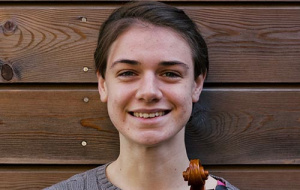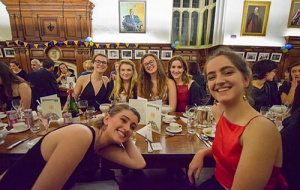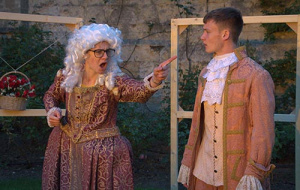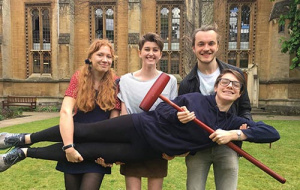Profile: Julia Sandros-Alper

Julia Sandros-Alper (2016, Music)
Julia is in her final year studying Music at Univ. She discusses the benefits of the college system, performing across the University and suffering from imposter syndrome.
Have you always been set on studying Music, or did you take a while to decide? What helped you come to a decision?
I come from a very musical family, with both of my parents being string players in the Portuguese Symphony Orchestra in Lisbon, and thus music has always been a huge part of my life. Despite having played the violin since I was four years old, it was only in Year 12 that I really started to take an active interest in the academic side of music and began to explore different musical genres and composers in depth. At school, I loved subjects like History and English, but when I realised that I would only be studying one subject for three years, there was no question that Music was my choice.
Why did you choose Oxford? What made you choose Univ?
I chose Oxford rather than a conservatoire, because it offers an academic music degree as well as ample performance opportunities. I did the International Baccalaureate, which means that I was used to a diverse curriculum. The Oxford Music degree offers a huge range of choices, encompassing performance, composition, and music history, and that was the kind of intellectual stimulation I was looking for. I applied to Merton College, but I was pooled here by my tutors, who teach at both colleges, and I could not be happier! My favourite things about Univ are the central location, the spicy spirals in Hall, and the extremely friendly atmosphere among staff and students alike.

Julia (back left) with friends at the Univ Women’s Formal
Was there a particular area of your subject that you were interested in before you applied? How did you explore that area further?
Violin performance is the part of my degree where I had the most previous experience and exploring the many performance opportunities, both inside and outside of College, was something I was very much looking forward to. I was not familiar with all of the areas I would go on to study, but I always enjoyed analysing music at school, and I have definitely sharpened my analytical skills here. Musical analysis is one of the academic areas where you can be creative and find your own personal way of interpreting a piece of music, which I think is both challenging and fun!
How do you think you have changed since walking through Univ’s doors as a fresher?
I think I have changed immensely since the day I first walked through the Univ Lodge with a large suitcase and a nervous smile. The academic work for my degree has taught me to think in a completely different way, and the challenging teaching provided by my tutors has been invaluable. I have gained confidence in myself, my ideas, and the way that I express them. I have also grown a lot as a person, and I have seen my friends do the same. One of the great things about being in a college is that it allows you to make mistakes and learn from them within a supportive and safe environment.

Julia in ‘Nell Gwynn’, the Univ Garden Play, last Trinity term
What else do you do apart from your subject in Oxford?
As a Music student, I have been involved in a large number of extra-curricular activities. These include being president of the University College Music Society (UCMS), singing in the Univ Chapel Choir, playing the violin in various University-wide orchestras, playing both the violin and the viola in numerous chamber music concerts across the University, and performing in the musical production of Candide at the Oxford Playhouse and in the annual Univ Garden Play. I wish I had more to say about my career in College sports, but I am proud to have reached the third round in Croquet Cuppers, and the second round in Skiing Cuppers. Lastly, like any sensible Univite, I also frequent the nocturnal establishment “The Bridge”.
Has anything surprised you about Oxford?
I am not sure exactly what I expected, but I was surprised by how seemingly “normal” all of the students were. The stereotypical idea of Oxbridge students being aloof and snobbish is certainly not true, and I have only been met by friendliness and inclusion during my time here. When I arrived, I was also astonished by the number of impressive projects run entirely by students, such as theatre productions or orchestras, always at a very high level. Another surprise was how much time you have for extra-curricular activities if you manage your time well.
Have you faced any challenges in your time at Univ? How did you overcome them?
In the beginning, I suffered slightly from imposter syndrome like everyone else. Having always lived in Portugal, it was daunting moving to a different country. As my parents are Swedish and American, I have always felt like a foreigner wherever I go, but my American accent stands out in the UK. I was afraid I would come across as unsophisticated or less intelligent in front of my tutors because of my accent, but this anxiety quickly dissipated. I think the way to overcome most challenges is to be confident enough in yourself to ask for help when you need it!

Julia with her Croquet Cuppers team
How do you feel about the celebration of 40 years of women at Univ? How far do we have left to go?
I am extremely excited to celebrate 40 years of women at Univ. We had a wonderful Women’s Formal in Michaelmas Term, and seeing incredible Univ women who paved the way for us, such as Helen Cooper and Amanda Brookfield, at the event was very inspiring. I think we still have a very long way to go, but every small step counts. As a choir member, I am very happy that our Director of Music, Giles Underwood, has decided to incorporate many more works by female composers into our evensong repertoire.
Gender inequality is still a big problem in the music industry, especially in areas like composition, thus it is fantastic to see these conscious changes being made. It is important to remember that both women and men benefit from gender equality and that the more we talk about these issues, the more we can understand each other and move forward in a way beneficial for everyone.
 Women at Univ 2019. Celebrating 40 years of achievement by women students, academics and staff, and recovering the history of women in the College from 1249 to the present day.
Women at Univ 2019. Celebrating 40 years of achievement by women students, academics and staff, and recovering the history of women in the College from 1249 to the present day.
Published: 13 May 2019
